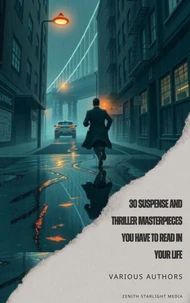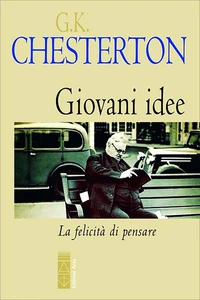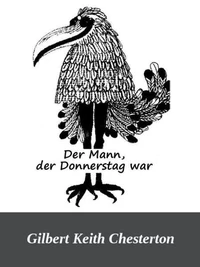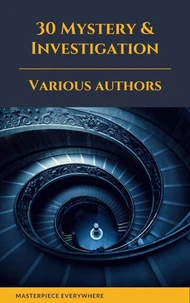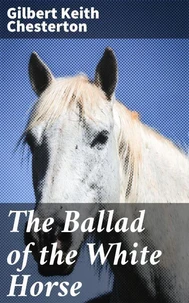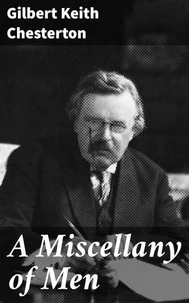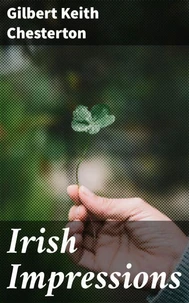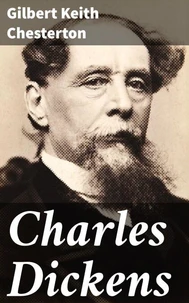The Man Who Knew Too Much
Par :Formats :
Disponible dans votre compte client Decitre ou Furet du Nord dès validation de votre commande. Le format ePub est :
- Compatible avec une lecture sur My Vivlio (smartphone, tablette, ordinateur)
- Compatible avec une lecture sur liseuses Vivlio
- Pour les liseuses autres que Vivlio, vous devez utiliser le logiciel Adobe Digital Edition. Non compatible avec la lecture sur les liseuses Kindle, Remarkable et Sony
 , qui est-ce ?
, qui est-ce ?Notre partenaire de plateforme de lecture numérique où vous retrouverez l'ensemble de vos ebooks gratuitement
Pour en savoir plus sur nos ebooks, consultez notre aide en ligne ici
- Nombre de pages204
- FormatePub
- ISBN859-65--4708675-8
- EAN8596547086758
- Date de parution20/07/2022
- Protection num.Digital Watermarking
- Taille550 Ko
- Infos supplémentairesepub
- ÉditeurDIGICAT
Résumé
In "The Man Who Knew Too Much, " G. K. Chesterton crafts a compelling collection of short stories that intertwines mystery, philosophy, and social commentary. The book features the adventurous detective work of Horne Fisher, a character whose acumen transcends mere crime-solving as he grapples with moral complexities and the enigmatic nature of truth. Chesterton employs a distinctive narrative style characterized by wit, paradox, and rich imagery, which reflects the intricacies of Edwardian society and its psychological undercurrents.
The stories push the boundaries of the detective genre, inviting readers to ponder the deeper implications of knowledge and ignorance, making it both a thrilling and intellectually stimulating read. A prolific writer known for his defense of faith and critique of modernity, Gilbert Keith Chesterton was profoundly influenced by his surroundings and the philosophical debates of his time. His background as a journalist and essayist dedicated to exploring social justice shines through in this work, where Fisher often finds himself navigating moral dilemmas indicative of early 20th-century anxieties.
Chesterton's own explorations of spirituality and human nature are intricately woven into the fabric of the narrative. "The Man Who Knew Too Much" is highly recommended for readers seeking to engage with a layered narrative that challenges conventional notions of justice and morality. Chesterton's ability to intertwine thrilling detective elements with profound philosophical inquiries offers a unique reading experience that resonates well beyond the genre, making it an essential addition to any literary collection.
The stories push the boundaries of the detective genre, inviting readers to ponder the deeper implications of knowledge and ignorance, making it both a thrilling and intellectually stimulating read. A prolific writer known for his defense of faith and critique of modernity, Gilbert Keith Chesterton was profoundly influenced by his surroundings and the philosophical debates of his time. His background as a journalist and essayist dedicated to exploring social justice shines through in this work, where Fisher often finds himself navigating moral dilemmas indicative of early 20th-century anxieties.
Chesterton's own explorations of spirituality and human nature are intricately woven into the fabric of the narrative. "The Man Who Knew Too Much" is highly recommended for readers seeking to engage with a layered narrative that challenges conventional notions of justice and morality. Chesterton's ability to intertwine thrilling detective elements with profound philosophical inquiries offers a unique reading experience that resonates well beyond the genre, making it an essential addition to any literary collection.
In "The Man Who Knew Too Much, " G. K. Chesterton crafts a compelling collection of short stories that intertwines mystery, philosophy, and social commentary. The book features the adventurous detective work of Horne Fisher, a character whose acumen transcends mere crime-solving as he grapples with moral complexities and the enigmatic nature of truth. Chesterton employs a distinctive narrative style characterized by wit, paradox, and rich imagery, which reflects the intricacies of Edwardian society and its psychological undercurrents.
The stories push the boundaries of the detective genre, inviting readers to ponder the deeper implications of knowledge and ignorance, making it both a thrilling and intellectually stimulating read. A prolific writer known for his defense of faith and critique of modernity, Gilbert Keith Chesterton was profoundly influenced by his surroundings and the philosophical debates of his time. His background as a journalist and essayist dedicated to exploring social justice shines through in this work, where Fisher often finds himself navigating moral dilemmas indicative of early 20th-century anxieties.
Chesterton's own explorations of spirituality and human nature are intricately woven into the fabric of the narrative. "The Man Who Knew Too Much" is highly recommended for readers seeking to engage with a layered narrative that challenges conventional notions of justice and morality. Chesterton's ability to intertwine thrilling detective elements with profound philosophical inquiries offers a unique reading experience that resonates well beyond the genre, making it an essential addition to any literary collection.
The stories push the boundaries of the detective genre, inviting readers to ponder the deeper implications of knowledge and ignorance, making it both a thrilling and intellectually stimulating read. A prolific writer known for his defense of faith and critique of modernity, Gilbert Keith Chesterton was profoundly influenced by his surroundings and the philosophical debates of his time. His background as a journalist and essayist dedicated to exploring social justice shines through in this work, where Fisher often finds himself navigating moral dilemmas indicative of early 20th-century anxieties.
Chesterton's own explorations of spirituality and human nature are intricately woven into the fabric of the narrative. "The Man Who Knew Too Much" is highly recommended for readers seeking to engage with a layered narrative that challenges conventional notions of justice and morality. Chesterton's ability to intertwine thrilling detective elements with profound philosophical inquiries offers a unique reading experience that resonates well beyond the genre, making it an essential addition to any literary collection.


